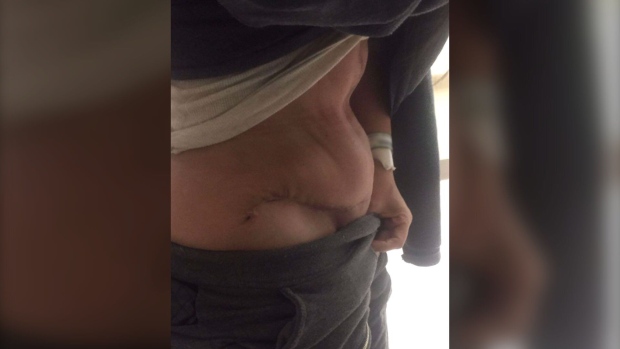WARNING: This story contains brutal images.
Some people get tummy tucks, some get Brazilian butt lifts, and some, like Tonya McDougal, get both.
For Canadians seeking plastic surgery, the allure of cheaper options overseas is obvious: They are often a fraction of the cost in Canada. McDougall spent about $4,500 Canadian for a butt-lift procedure that was listed on a Toronto clinic’s website as $10,500 to $16,500 before taxes.
But some patients return with life-threatening complications, which can lead to high medical costs.
Ms McDougall is one of several women who have sounded the alarm after cosmetic surgery gone wrong in the Dominican Republic, leaving them with dangerous infections, years of treatment and permanent scarring.
Four years ago, when McDougall returned from surgery she had been promised would be safe, but ended up with a severe infection that killed flesh and left a large hole in her abdomen, forcing her to spend two months in hospital and then recover at home for a year and a half.
“When I got it back I knew something was seriously wrong,” McDougall said of the blackened, pus-filled tissue.
“When they removed the bandages there was a hole in my stomach the size of a fist. Big enough to fit a fist through. It was awful.”
McDougall was diagnosed with drug-resistant tuberculosis, contracted from unsterile instruments and a contaminated water source at the clinic in the Dominican Republic where she had her surgery. Doctors at a Toronto-area hospital had to remove heavily infected tissue from her abdomen as part of her treatment.
“I went into depression. I was crying all the time. It was hard,” she said.
McDougall is not alone: there have been many similar cases over the past few years.
Two years ago, the US Centers for Disease Control and Prevention received reports of 52 people from nine states who had contracted surgical infections after undergoing cosmetic surgery in the Dominican Republic. At the time, the center issued a travel warning for the specific clinic where most of the cases originated.
Meanwhile, studies and articles have been published in medical journals and other sources highlighting this issue.
One such study noted that a rare tuberculosis pathogen is spreading as a result of “increased fat tourism” and recommended greater awareness of this type of infection among both the medical community and the general public.
Despite the warnings, medical tourism continues to attract patients seeking affordable treatment, and at least three deaths have been reported in the United States in recent months linked to botched surgeries in the Dominican Republic.
Another Canadian patient, “Carmen,” said she went to the Caribbean country for tummy tuck surgery.
Carmen, who did not want to give her real name, returned to Toronto with a severe infection that left her hospitalized for six months and on antibiotics for two years. She said she was in so much pain she could not stand up straight. What’s more, doctors performed a butt lift on her during her stomach reduction surgery, against her wishes.
“In the Dominican Republic, I was basically forced to work with dirty tools. I just went because I really wanted to do it and didn’t think about it after,” she said. “But it’s not worth it.”
“Julie,” who also did not want to be identified, became ill three weeks after returning to Canada following surgery in the Dominican Republic.
“I felt dizzy. My stomach was bloated. I felt like I was about five or six months pregnant and there was this oozing fluid coming out of my belly button,” she said. She, too, developed a similar drug-resistant infection that required a lengthy hospital stay and aggressive antibiotic treatment.
Medical tourism has grown in popularity over the years, but the public still isn’t aware of its risks, said Valorie Crooks, a professor at Simon Fraser University who studies medical tourism.
“It’s not being tracked, traced or regulated,” she said. “We have no idea how many people have gone overseas, whether it’s from Canada or from other countries.”
Health Canada warns about the risks of medical tourism on its website and offers recommendations for travellers considering the option, but it has no statistics on infections or complications among travellers who return to Canada after receiving treatment overseas.
“Be aware of the risks, talk to your doctor at home, and pursue all information you can get, especially information that isn’t provided directly by your doctor or clinic,” Crooks said.
But not all traveling patients are unaware of the risks.
“I knew the risks before I went to the Dominican Republic but I wanted so badly to achieve that look. I never thought it would happen to me, but it did,” Julie said.
“I blamed myself because not only had I experienced the physical pain, the financial debt, and the pain and suffering my children had experienced, but my children had also seen their mother suffer.”
These women’s experiences serve as a warning to others tempted by low-cost surgical options abroad.
“I could have died. Yes, I’m lucky to be alive today,” McDougall said.


